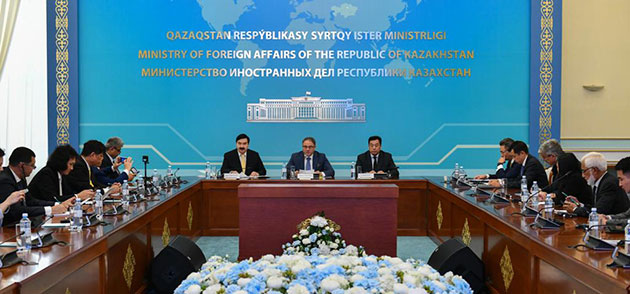ASTANA, Kazakhstan, Oct 11 (IPS) – In the heart of Central Asia, a nation renowned for its rich cultural diversity, multi-ethnic society, and spiritual traditions has emerged as a global beacon of interfaith harmony and understanding. Over the past two decades, Kazakhstan’s Congress of Leaders of World and Traditional Religions (The Congress) has played an instrumental role in promoting dialogue, forging unity, and advocating for peace among diverse faiths worldwide. Rooted in Kazakhstan’s deep spiritual heritage and wisdom, this initiative has evolved into a symbol of international cooperation and tolerance. As we reflect on its remarkable journey and look ahead to its future under the leadership of President Kassym-Jomart Tokayev, it becomes evident that the Congress is poised to make even greater strides toward fostering global harmony and unity.
A History of Resilience and Tolerance
Kazakhstan’s history is a tapestry woven with threads of resilience, tolerance, and spiritual fortitude. A nation that transitioned from a nomadic civilization to a modern, multi-ethnic, and multi-religious society faced numerous trials and tribulations along the way. Yet, the Kazakh people maintained a steadfast connection to their spiritual roots, allowing them to thrive in a diverse and inclusive society.
The hardships endured by the Kazakh people throughout history have shaped their deep spirituality and wisdom. From Russian imperial expansion to the ravages of the USSR era, Kazakhstan faced tremendous challenges. Forced settlement policies, famine, and the suppression of cultural and religious identity were stark realities. However, these trials also ignited a collective spirit of survival and resilience, demonstrating the importance of cultural preservation and the celebration of diversity.

Kazakhstan’s journey to independence brought with it a commitment to religious freedom and tolerance. From 1949 to 89, the USSR conducted 456 nuclear tests at the Semipalatinsk nuclear testing site in eastern Kazakhstan, an area roughly equivalent in size to Belgium. It is estimated that about 1.5 million people suffered health effects because of these tests. Despite this history of adversity, when the USSR dissolved, Kazakhstan, not only guaranteed equality for all ethnic groups and religious freedom but also successfully secured the closure of the Semipalatinsk nuclear testing site and the complete abandonment of the world’s fourth-largest nuclear arsenal. Since then, Kazakhstan has been one of the most active countries in advocating for a “nuclear-free world” based on the UN framework.
Despite Soviet policies aimed at eradicating nomadic culture and promoting settlement, Kazakhstan successfully preserved its rich cultural heritage. The nation not only maintained traditions passed down from ancestors but also enshrined in its constitution a policy that treats the traditions, cultures, and religions of non-Kazakh people as equal to Kazakh culture. This forward-thinking approach promotes social harmony and serves as a powerful lesson from the suppression of Kazakh culture during the USSR era.
The Congress: A Shining Beacon
The Congress stands as a beacon of interfaith harmony, powered by Kazakhstan’s deep commitment to religious tolerance. Serving as a distinctive forum, it unites leaders from myriad faiths to jointly foster global peace. Kazakhstan, with its mosaic of Islamic, Turkic, and nomadic influences, offers a melting pot for dialogues that intertwine East with West and bridge diverse religious doctrines. Upholding a neutral stance in global affairs, Kazakhstan ensures the Congress remains a sanctuary for unbiased, apolitical discussions. Addressing urgent issues like religious extremism, terrorism, and environmental threats, the Congress strives for collective solutions.
President Tokayev’s Vision for the Future
As the Congress is poised for further evolution. President Tokayev’s leadership brings a renewed focus on interfaith dialogue and cooperation in a world grappling with increasing complexity. While he believes diplomacy is essential in facilitating cooperation, he sees religious leaders (Approximately 85% of the world’s population identifies with a religion) as indispensable agents of change in building a new world system focused on peace. He emphasizes the shared principles of all religions, such as the sanctity of human life, mutual support, and the rejection of destructive rivalry and hostility, as the foundation for such a system.
President Tokayev outlines practical ways in which religious leaders can contribute to world peace, including healing societal wounds following conflicts, preventing negative trends that undermine tolerance, and addressing the impact of digital technology on society. He highlights the need to cultivate spiritual values and moral guidelines to navigate the challenges posed by rapid technological advancements.
A Future of Unity and Harmony
As the Congress continues to evolve, it serves as a beacon of hope in an increasingly divided world. Kazakhstan’s steadfast dedication to interfaith dialogue reminds us that spirituality and wisdom can pave the path to a more peaceful and harmonious global society.
Kazakhstan’s journey from its tumultuous past to a beacon of hope for interfaith dialogue is a testament to the deep spirituality and wisdom of its people. The Congress continues to illuminate the path to global harmony and unity, demonstrating the power of dialogue, mutual understanding, and the enduring human spirit.
Katsuhiro Asagiri is President of INPS Japan
IPS UN Bureau
Follow @IPSNewsUNBureau
Follow IPS News UN Bureau on Instagram
© Inter Press Service (2023) — All Rights ReservedOriginal source: Inter Press Service
Check out our Latest News and Follow us at Facebook
Original Source
